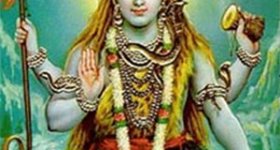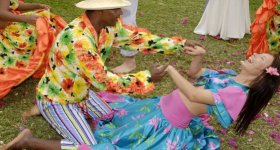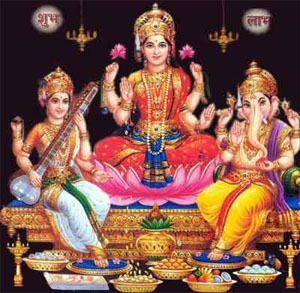
Diwali or Deepavali is the marriage of two Sanskrit words: Deepa which in Sanskrit means “Light" and Awali which means “row” – “Row of Light”. The festival of light is celebrated all over India and symbolizes the victory of light over darkness, good over evil. Diwali is celebrated in the month of Kartik (October/November) on the night of the New Moon.
In the north of India, Diwali is celebrated in honor of Rama's (The prince of Ayodhya, Lord Rama is the supreme god in Hinduism) return home after long wanderings and lights illuminated his path. In the south of India it is the festival of victory of Rama over the demon king Ravana and also commemorates Krishna's (The eighth incarnation of Lord Vishnu in Hinduism) destruction of the demon Narakasuran. But in most part of India this festival is dedicated to the goddess of wealth, purity and light, Lakshmi the consort of Lord Vishnu.
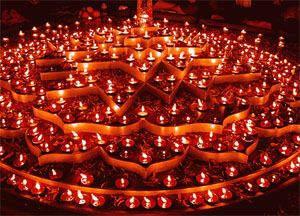 The week preceding the Diwali celebrations, Hindus observe fasting, the body is cleansed as a result of abstinence and the soul is purified through daily prayer and meditation. They clean their homes and its surrounding and purify themselves in preparations for Lakshmi Pooja. On the day of Diwali Hindus join with their families and the Pandit (priest) and they worship the divine Goddess Lakshmi to gain blessings of wealth and prosperity, the triumph of good over evil and light over darkness.
The week preceding the Diwali celebrations, Hindus observe fasting, the body is cleansed as a result of abstinence and the soul is purified through daily prayer and meditation. They clean their homes and its surrounding and purify themselves in preparations for Lakshmi Pooja. On the day of Diwali Hindus join with their families and the Pandit (priest) and they worship the divine Goddess Lakshmi to gain blessings of wealth and prosperity, the triumph of good over evil and light over darkness.
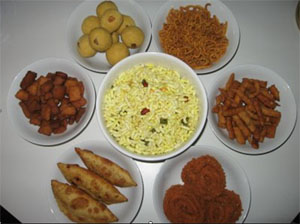 Diwali is the festival of lights, fireworks and traditional sharing of sweets. After the prayers to Goddess Lakshmi the women start preparing delicacies, sweets and savories that are specially made for the family, neighbours and friends. The list of Diwali special sweets is exhaustive. Gulab Jamun, Gajar Ka Halwa, Besan Ke Ladoo, Karanji and Jalebis are the most commonly made sweets on this occasion. By tradition, there should be at least 7 types in the dough. All sweets have to be prepared before sunset. At sunset in each Hindu family prayers are addressed to the Goddess Lakshmi and offering of sweets are made to her on a copper plate called, Tali which is decorated with flowers and earthen oil lamps. Only then sweets can be offered to all mortals packed in beautiful and colorful gift boxes. In today’s world where everyone is busy, the celebration of Diwali has its own importance in continuing to maintain the love between brothers and sisters, colleagues, neighbours and relatives. It is the day of food-sharing; gift-giving and reaching out to the inner most depths of the hearts.
Diwali is the festival of lights, fireworks and traditional sharing of sweets. After the prayers to Goddess Lakshmi the women start preparing delicacies, sweets and savories that are specially made for the family, neighbours and friends. The list of Diwali special sweets is exhaustive. Gulab Jamun, Gajar Ka Halwa, Besan Ke Ladoo, Karanji and Jalebis are the most commonly made sweets on this occasion. By tradition, there should be at least 7 types in the dough. All sweets have to be prepared before sunset. At sunset in each Hindu family prayers are addressed to the Goddess Lakshmi and offering of sweets are made to her on a copper plate called, Tali which is decorated with flowers and earthen oil lamps. Only then sweets can be offered to all mortals packed in beautiful and colorful gift boxes. In today’s world where everyone is busy, the celebration of Diwali has its own importance in continuing to maintain the love between brothers and sisters, colleagues, neighbours and relatives. It is the day of food-sharing; gift-giving and reaching out to the inner most depths of the hearts.
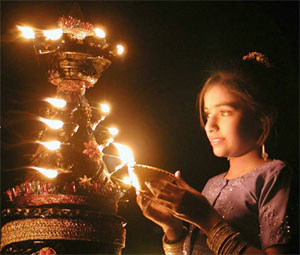 Earthen oil lamps named diyas are lit and placed in front of every home to dispel darkness and to welcome Lakshmi, the Goddess of wealth and prosperity which will bring joy, happiness and prosperity in the house for the coming year.
Earthen oil lamps named diyas are lit and placed in front of every home to dispel darkness and to welcome Lakshmi, the Goddess of wealth and prosperity which will bring joy, happiness and prosperity in the house for the coming year.
On this auspicious day when night falls cities and villages are illuminated with lights. Earthen diyas, Multi-colored lights illuminating trees, buildings, terraces and houses turning the island into a fairyland of flickering lights.
On this day all Mauritians, regardless of their religion,
wish each other
HAPPY DIVALI!!!









